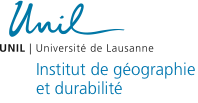Institute of Geography and Sustainability of the University of Lausanne
Research projects
Social resilience in the Sundarbans Delta: Eliciting Needs-based Grassroots Action through Cross-Group Engagement (ENGAGE)
| Research fields |
Political ecologies |
| Keywords |
Living lab Resilience Agroecology Governance |
| Funding | Solution-oriented Research for Development (SOR4D) -- Swiss National Science Foundation & Swiss Agency for Development and Cooperation |
| Duration | Mai 2023 - April 2026 |
| Website | https://engage4sundarbans.org/ |
| Researchers |
Véron René (Principal Investigator) [web] [email] Cremin Emilie (Project co-coordinator) [web] [email] Mukherjee Jenia (Indian Institute of Technology, Kharagpur) Selim Samiya (University of Liberal Arts Bangladesh) |
The project seeks to enhance social resilience together with inhabitants of the Sundarbans in India and Bangladesh who are exposed to multiple climate and other risks.
The inhabitants of the tidally active lower deltaic plain of the Ganges-Brahmaputra-Meghna basin adja-cent to the Sundarbans Mangrove Forest in India and Bangladesh are highly exposed to multiple risks, including from cyclones, salinization, pandemics, and socioeconomic marginalization. While exposure to these hazards has built local resilience and relevant knowledge to interact within this par-ticular social-ecological system, climate change and state interventions represent ongoing challenges for local communities.
The project aims to understand plural accounts and interpretations of the Sundarbans' 'riskscape' produced by state and non-governmental actors and diverse members of the local communities. It seeks to support situated adaptive practices that enhance social resilience through the implementation of experiments in inland fishing and integrated farming based on transdisciplinary engagement across the political boundaries of the Sundarbans.
While the conventional approach of climate change adaptation in the Sundarbans relies on top-down technical solutions and the managed relocation of communities, our 'living lab' experimentations build on existing situated adaptive practices with the goals to enhance social resilience, reduce multiple risks and provide alternatives to outmigration.

